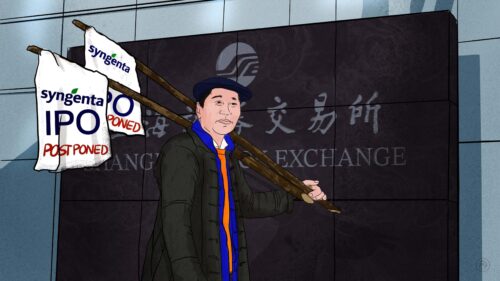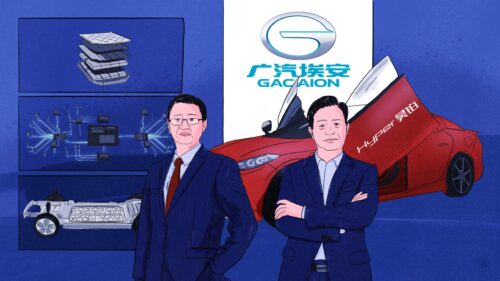CALB — lithium battery giant with state defense ties — has lackluster IPO
What should have been a hot public offering in a hot battery sector barely made even. It’s a tough environment and these are tough times for Hong Kong IPOs. Even for companies backed by state-owned Chinese defense equipment companies.

CALB 中创新航, China’s third-largest lithium battery manufacturer after CATL 宁德时代 and BYD 比亚迪, today went public on the Hong Kong Stock Exchange, selling 265.8 million shares and raising HK$9.86 billion ($1.25 billion). Although it was the largest IPO in Hong Kong this year, CALB’s stock price ended the day at HK$38 ($4.84), the bottom of the range earmarked for the IPO.
Cornerstone investors, i.e. investors who committed to acquiring a fixed amount of shares at the early stages of the IPO process, include lithium miner Tianqi Lithium 天齐锂业, electric vehicle (EV) manufacturer XPeng 小鹏汽车, and smartphone manufacturer Vivo Communication Technology 维沃移动通信. The cornerstone investors accounted for HK$5.78 billion ($735 million), or 56.17%, of the total IPO amount, even though the institutional portion of the IPO was only 2.11 times covered, well below the traditional subscription rates of Hong Kong IPOs.
CALB plans to allocate about 80% of the funds raised in the IPO for increasing production by 95 gigawatt hours (GWh) at the company’s plants in Chengdu and Meishan (Sichuan Province), Wuhan (Hubei Province), Hefei (Anhui Province), and Guangdong Province; 10% will be used for research and development; and 10% for general expenses. CALB is currently the core battery supplier of GAC Group 广汽集团, Changan Automobile 长安汽车, SAIC-GM-Wuling 上汽通用五菱, Leapmotor 零跑汽车, and XPeng. In 2021, according to one article, CALB held a share of 5.9% of China’s battery market. In November last year, CALB announced an increase in production capacity from the original target of 300GWh in 2025 to 500 GWh.
Established in 2009 by the state-owned defense contractor Aviation Industry Corporation of China (AVIC) 中国航空工业集团 under the name China Aviation Lithium Battery (Jiangsu) 中航锂电 (the current name was adopted in November 2021) and headquartered in Changzhou, Jiangsu Province, CALB was spun off from AVIC in a corporate restructuring ahead of the IPO, with AVIC retaining a share of 10%.
According to the prospectus, CALB’s annual revenue from 2019 to 2021 was 1.73 billion yuan ($243.58 million), 2.82 billion yuan ($396.84 million), and 6.81 billion yuan ($957.61 million), respectively, while net profit was -156 million yuan ($21.91 million), -18.33 million yuan ($2.57 million), and 112 million yuan ($15.73 million). In the first half of 2022, CALB’s revenue was 9.16 billion yuan ($1.28 billion), an increase of 252% compared to 2.60 billion yuan ($365.23 million) in the same period last year.
CALB’s lackluster public offering follows similarly tepid IPOs last week by electric vehicle (EV) manufacturer Leapmotor and Onewo 万物云, a unit of property developer Vanke 万科. Even though batteries is a rapidly expanding industry and global market, as per Reuters, investors are cautious about buying into new share sales when equities markets are weak: IPOs in Hong Kong are down nearly 75% so far in 2022 compared with the same time last year, amid the Russian invasion of Ukraine and rising interest rates.
Why aren’t investors snapping up shares in electric car and battery companies? General economic and stock market gloom explains some of it. But in CALB’s case, there is another factor that investors may be considering: CALB was founded by and is still partly owned by a Chinese state-owned defense company. Its products have no future in American cars or in the batteries of countries that seek to please the U.S.






